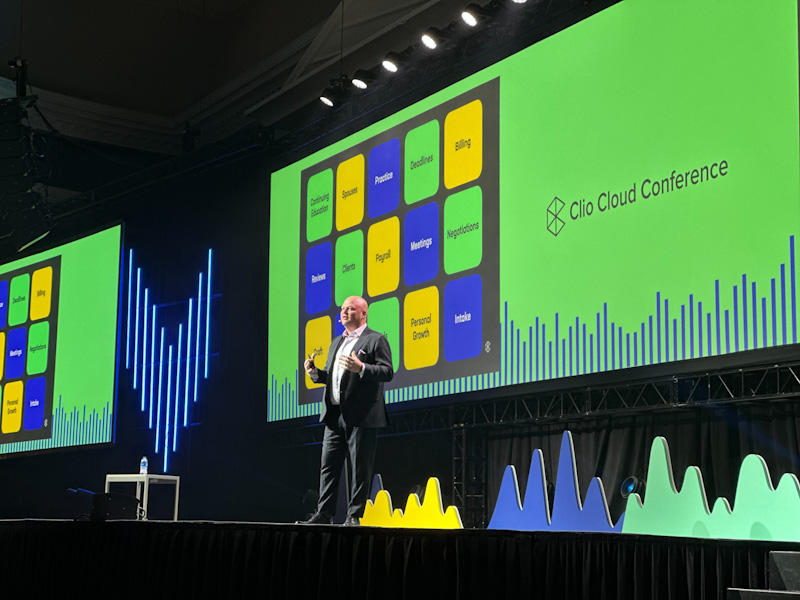Clients more optimistic about AI than legal professionals, says Clio's 2023 Legal Trends Report

Clio CEO and founder Jack Newton speaks at the 2023 Clio Cloud Conference on Oct. 9. “Like the cloud and the smartphone, AI is going to reshape every industry it touches,” Newton said. Photo courtesy of Clio.
While generative artificial intelligence will transform legal work, there are key differences in how legal professionals and clients are thinking about AI, with clients more optimistic about the tech, according to Clio’s eighth annual Legal Trends Report, which Clio founder and CEO Jack Newton introduced Monday.
When Newton took the stage at last year’s Clio Cloud Conference, it was just weeks before OpenAI released its now-wildly popular chatbot ChatGPT in November 2022. In the months since, generative AI might not have upended the legal industry, but it has been disruptive, with many law firms making use of the new technology.
Newton, who spoke Monday morning in the ballroom of the Gaylord Opryland Resort & Convention Center in Nashville, Tennessee, to open this year’s Clio Cloud Conference, said generative AI could meet the massive demand for legal services to help narrow the justice gap.
“AI is the biggest innovation we’ve seen in a generation. It’s an advancement as significant as the invention of the transistor or the PC,” Newton said. “Like the cloud and the smartphone, AI is going to reshape every industry it touches.”
ChatGPT has sparked intense debate about the future of work, with some lawyers and legal professionals worried that AI could replace them. For Newton, the answer to the question of whether the technology will make lawyers obsolete is an “emphatic no.”
“Ultimately, this isn’t a matter of AI replacing lawyers, any more than spreadsheets replaced accountants. AI won’t make lawyers irrelevant. But those who embrace it will dominate over those that do not,” Newton said.
The Legal Trends Report surveyed 1,446 legal professionals, including lawyers, paralegals and administrators, from May 31 to July 20; and 1,012 adults in the U.S. general population, from June 13 to June 22.
The new report echoed other surveys attempting to gauge the early attitudes toward the new technology, suggesting that the tech will help lawyers and others in the profession work faster and more efficiently.
Yet despite the technology’s early promise, legal professionals and clients are cautious, according to the report, although “more consumers see the potential advantages of AI to improve efficiencies and reduce the overall cost of legal services.”
The report states that clients and potential clients are “slightly more optimistic” about the benefits of AI when it comes to better affordability and higher-quality legal services.
In addition, 32% of clients are more likely to agree that AIʼs benefits outweigh the costs, compared to 19% of legal professionals. The same percentage of clients think that the justice system could be improved with AI, compared to 19% of legal professionals; 27% of clients say that courts should use AI, compared to 17% of legal professionals; and 32% of clients think that AI will improve the quality of legal services, compared to 21% of legal professionals.
Even though lawyers and other legal professionals are wary, 19% of lawyers already use AI in their practices, and 51% plan to use it. Among the 71% of those planning to use it, they want to do so within the next year, according to the report.
Newton said the paradox is that AI would give lawyers the chance to be “more human” in their everyday work.
“Rather than turning lawyers into robots, AI will help take the robotic tasks away from lawyers and legal professionals,” Newton said. “If AI is the tool that helps us carry the burden of running a law firm, it in turn optimizes our time. so that we can focus on the more meaningful work of connecting and helping other human beings.”
Aside from surveying attitudes to AI, the report found that there are marked gains in productivity and growth, with legal professionals working 40% more cases and producing 70% more billable hours in comparison to 2016. They are collecting 72% more over the same period.
Firm utilization (the hours that lawyers put toward billable work) has increased 32%, while realization rates (the billable hours included in client bills) have increased 12%, representing “steady growth and improved performance,” according to a Clio news release.
“This does mark a new era of productivity for the legal industry. It’s unprecedented. It’s something we’ve never seen before in our Legal Trends Report data,” Newton said.
However, collection rates are expected to decrease by 87% by the end of the year “suggesting that firms are struggling to get paid,” according to the news release.
Newton also unveiled several new products Monday, including a “Personal Injury-Add On”—a set of features that will become part of its practice management software Clio Manage and is aimed at the 50,000 personal injury lawyers practicing in the United States.
“Personal injury lawyers can leverage Clio to track the status of medical records and bills, manage expenses, organize damages and maximize client settlements,” Clio said in another news release.
Among other product announcements was Clio Duo—propriety generative AI software—which Clio plans to roll out to customers in 2024 and will eventually build into all its software. Among its features, the chatbot can summarize documents, generate bills, and make suggestions on how firms can improve performance.
The Clio Cloud Conference ends Tuesday. Newton said more than 2,500 people were attending in person and 2,100 virtually, including participants from more than 20 countries, including Chile, Norway, India and the United Kingdom.



